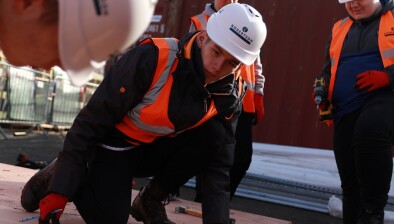Simon Capaldi: Why occupiers and landlords must work together as we return to the office

Simon Capaldi
Simon Capaldi, office agency partner at Knight Frank Edinburgh, on returning to the office and how the transition may take shape.
One year ago, some commentators were proclaiming the ‘death of the office’. Now, with vaccination programmes well underway, most people I speak to say they are actually looking forward to going back to their workplaces – albeit, perhaps not exactly in the same way as they did before.
A variety of studies in recent months have shown that workers do not want to return full-time, instead favouring a ‘hybrid model’ of time in the office and part of the week working from home. As the latest edition of Knight Frank’s (Y)our Space report shows, while offices are bound to go through some changes in the months ahead, they have also seldom been more important to occupiers.
Around 90% of respondents to the survey conducted for the report said that real estate remains a strategic part of their business. In Scotland, we have seen that playing out through Edinburgh’s resilient take-up figures over the course of 2020 and into 2021. Occupiers – despite many having very limited access to their workplaces – committed to hundreds of thousands of square feet of space in the city, including one of the biggest office deals of recent years.
The importance of office space may not have changed, but the way organisations and their staff use it almost certainly will – with the need for greater flexibility chief among them. Again, (Y)our Space points to some of the ways this could evolve: nearly four in 10 (37%) of the companies surveyed said they see their offices as a tool for improving employee wellbeing, collaboration, and talent attraction and retention.
Of course, there is no one-size-fits-all approach to how businesses go about this – it will need to be specific to each of their needs. Nevertheless, wellbeing is one of the main themes that has come to the fore, with nearly half (46%) of occupiers saying they plan to increase amenities available to staff in their offices, ranging from mental health support and gym facilities to on-site catering options.
Another major focus will be environmental, social and corporate governance (ESG) credentials. The pandemic has only increased occupiers’ appetite to be part of the fight against climate change, with a range of businesses and public sector institutions setting net zero targets. Their property footprint will be a critical part of those efforts.
The changing and varied needs of occupiers should provide landlords with food for thought – for one, they will need to create and provide space that can be quickly adapted. Perhaps of greater importance, it will also require changes to the traditional landlord-tenant dynamic, making way for relationships based on collaboration and communication.
To a degree, there are tentative signs that the pandemic has already helped foster new ties: 60% of (Y)our Report survey respondents said they had seen an increase in communication with their landlord and figures we obtained from RICS earlier this year showed the number of rent disputes referred to third-party determination halved last year in Scotland. The pay off for landlords will come in the form of more satisfied occupiers and, therefore, fewer void periods.
There is, however, still work to be done. Flexibility on space and terms was a prominent theme before the pandemic and is even more so now. Yet, 29% of occupiers said their biggest frustration with landlords was lack of flexibility and another fifth (21%) highlighted a lack of innovation. There are relatively simple steps that could be taken to make improvements, such as working with the likes of Backbone Connect to reduce initial set-up and internet connection times for new occupiers by up to 90%. Hobart House, in Edinburgh, has seen the benefit of this with reduced void and lead-in times for its IT set-up and connection.
The great working from home experiment may be drawing to a close, but the great return to the office is just about to begin. There have been some important lessons learned about the relationship between occupiers, their staff, their property, and landlords over the last 14 months that can inform how that process can, and perhaps should, unfold over the summer and beyond – to the benefit of them all.













